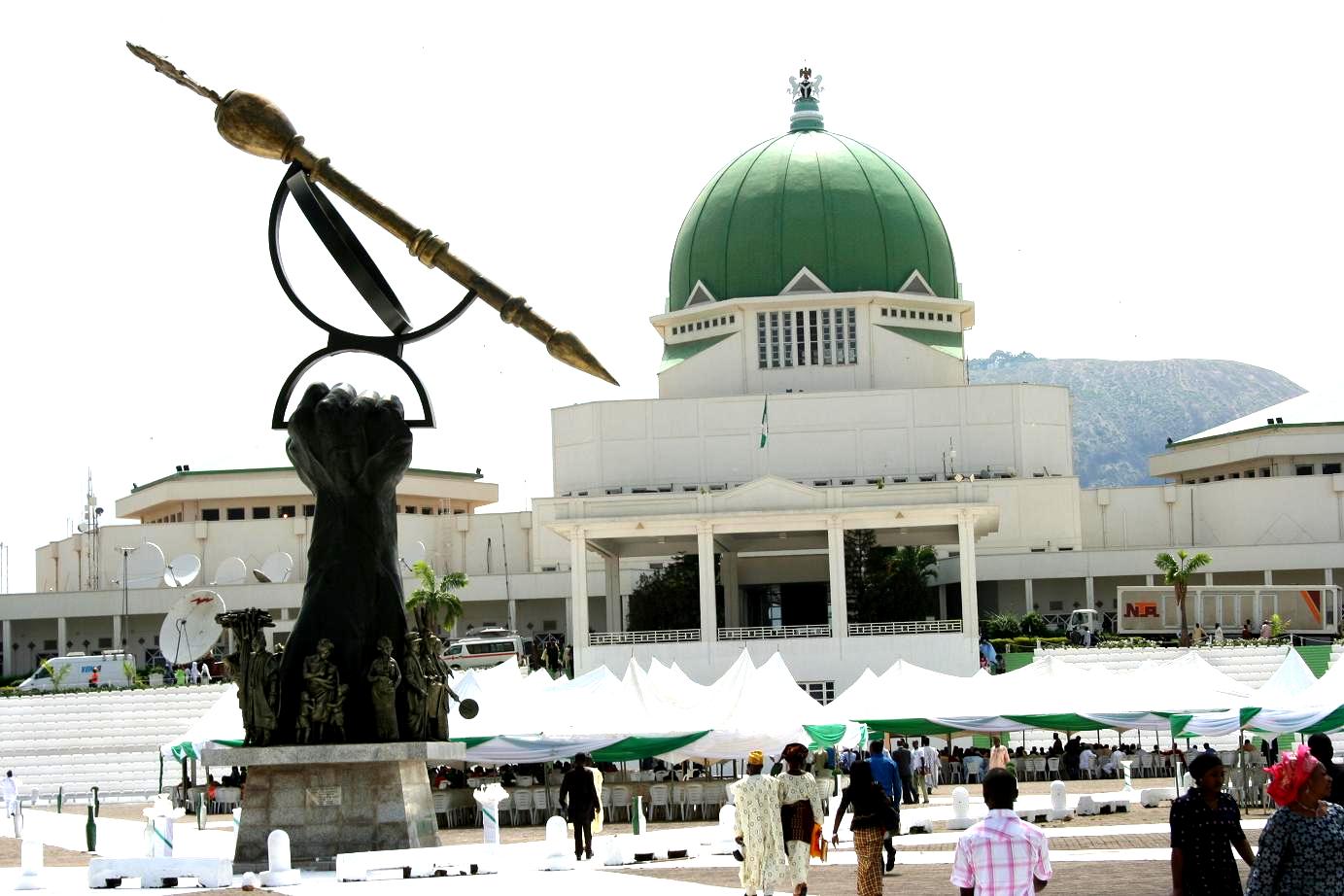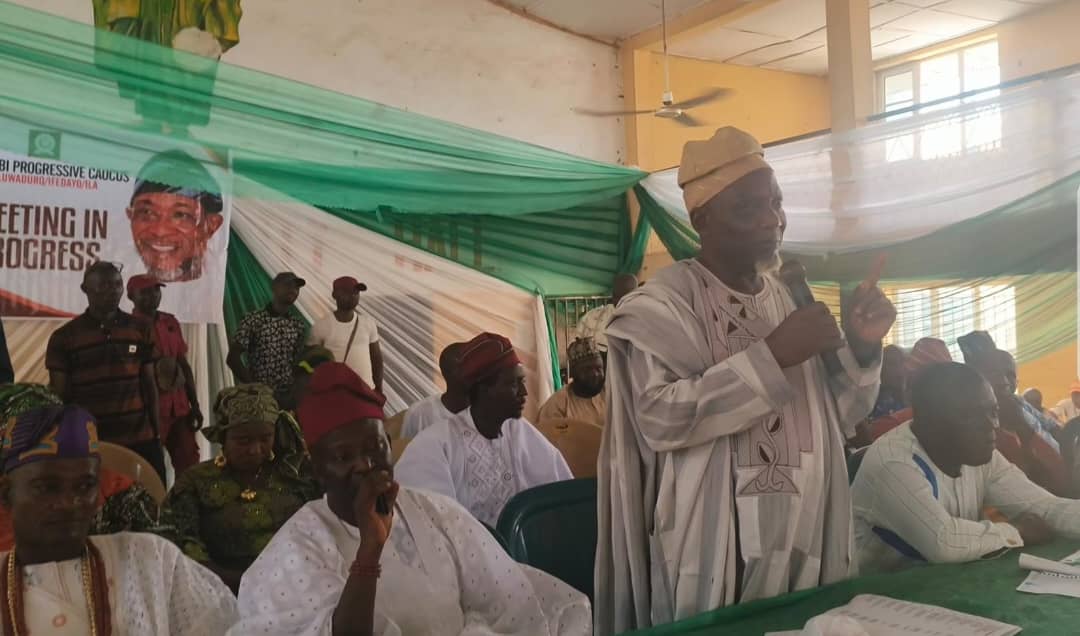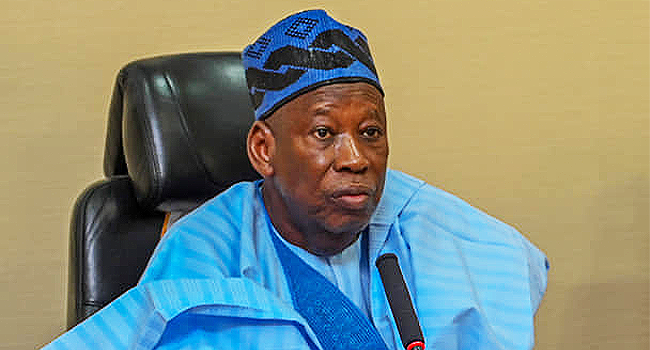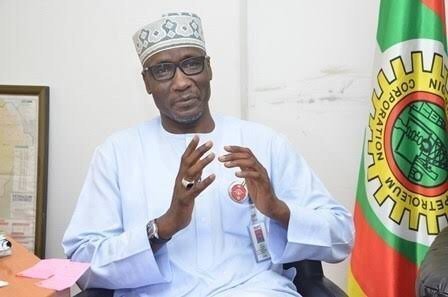By Olowogboyega Oyebade
Do you know that Osun has a rare commodity to export? Do you know what it is? Peace, of course! Do you know that leadership matters in everything? Are you aware that the calmness of Mr Adegboyega Oyetola, the Governor of the State, the ‘Antioch’s ambience of a christian in the Deputy Governor, Mr Gboyega Alabi, the humility of the Rt Honourable NajeemSalam, the Speaker of the House and the pacifist candour of the Chief Judge of the State are good commodities for our State to export to the world? You care to know more? Come along, please.
Have you ever heard accusation of ‘budget padding’ in the State of Osun? Have you ever heard crises between the executive and the legislature in this State? Have you ever seen our legislators in the State scaling through a high fence to gain entry into their chambers? Not at all! Are there no opposition members? Of course, there are. Are there nothing to fight about? There are! Do you know that what defines our State is the quality representation and leadership collectively demonstrated by our men in power? Do you know that as we praise the rectitude and altruism of the members of the OsunHouse of Assembly, we must recommend their model for the ninth National Assembly? Are you aware that it is not so in other lands? A land of peace is here where the Ibrahim Waziri’sbrand of ‘politics without bitterness’ is worshipped. Do you know that the National Assembly of Nigeria needs to copy OsunModel? Care for more? Come!
Do you know that Nigeria prides herself as a praying nation? Are you aware that as mandates are to be renewed on 29th May, 2019 at the national and State levels , Nigerians just need to pray for the President and Governors not to appoint liabilities? Do you know that we need to support the in-coming ninth National Assembly with prayers so as to ward off the ‘Hubris Syndrome’ in their leadership? How do you fix a National Assembly that has not been inaugurated and some of its characters are already dogging their parties with indiscipline? Can such characters justify a valid claim to democratic civilization? The prayer of Josiah Gilbert Holland interludes:
GOD, give us men!
A time like this demands
Strong minds, great hearts, true faith and ready hands;
Men whom the lust of office does not kill;
Men whom the spoils of office cannot buy;
Men who possess opinions and a will;
Men who have honor; men who will not lie;
Men who can stand before a demagogue
And damn his treacherous flatteries without winking!
Tall men, sun-crowned, who live above the fog
In public duty, and in private thinking;
For while the rabble, with their thumb-worn creeds,
Their large professions and their little deeds,
Mingle in selfish strife, lo! Freedom weeps,
Wrong rules the land and waiting Justice sleeps.”
Do you know that as we speak, the dust about 2019 budget is still ferocious in the National Assembly, an assembly that will be due for renewal in some weeks time? Do you know that such anomaly has telling effects on the economy of a nation and the welfare of its citizens? Are you aware that the cat and mouse relationship that existed between the Executive Arm and the National Assembly did more harm than good to the country? Do you know that this is the time for the executive and the legislature to bond on the IMF advice? Are you aware that IMF is not always right in every thing and that it is the collective leadership of a country that will choose the road to take? The poem of Kwesi Brew titled “The ‘ Mesh”:comes to mind:
“We have come to the crossroads
And I must either leave or come with you
But in the darkness of my doubts
You lifted the lamp of love
And I saw in your face
The road that I should take.
Have you heard the news? Do you know that theInternational Monetary Fund (IMF) has advised Nigeria to remove fuel subsidy and direct the money to the provision of social amenities for the country? Are you aware that Christine Lagarde, Managing Director of IMF, gave the advice during a press conference at the on-going joint annual Spring Meetings with the World Bank in Washington D.C.? Do you know that Lagarde advised that with the low revenue the country is generating, removal of fuel subsidy would enable it to have enough funds to provide the social needs of the people? The unsolicited advice of Lagarde interludes:
“I will give you the general principle. For various reasons and as a general principle, we believe that removing fossil fuel subsidies is the right way to go. If you look at our numbers from 2015, it is no less than about $5.2tn that is spent on fuel subsidies and the consequences thereof. And the Fiscal Affairs Department has actually identified how much would have been saved fiscally but also in terms of human lives if there had been the right price on carbon emission as of 2015. Numbers are quite staggering. I would add as a footnote as far as Nigeria is concerned that, with the low revenue mobilization that exists in the country in terms of tax to GDP, Nigeria is amongst the lowest. A real effort has to be done in order to maintain a good public finance situation for the country. And in order to direct investment towards health, education, and infrastructure. If that was to happen, then there would be more public spending available to build hospitals, to build roads, to build schools, and to support education and health for the people. …Now, how this is done is the more complicated path because there has to be a social protection safety net that is in place so that the most exposed in the population do not take the brunt of the removal of subsidies principle. So that is the position we take.”
Do you know that Lagarde has not told us about the spiral inflation that will follow the path, if followed? Do you know that she has not told us the devaluation of our currency that will follow the path, if experimented? Do you know that she has not told us the attendant poverty and unemployment that will trail the trail the policy if implemented now? Do you know that she keeps mum on the implications of the absence of universal social security scheme for all Nigerians to absorb the shocks of her recommendation? Do you know that this is the time all leaders must engage in robust debate to see the road we must take? You care for more? Come along, please.
Do you know that the out-going leadership of the 8th National Assembly did not give a good account to the business of law-making? Do you know that its leadership engaged our collective psyche with battle for supremacy between it and the Executive? Are you aware that while these struggles were in the arena, the business of legislation took a sudden flight and the economy tottered? We remember Senator Fulbright. Come along please.
James William Fulbright (9th April , 1905 – 9th February 9, 1995) was a United States Senator representing Arkansas from January 1945 until his resignation in December 1974. Do you know that he was elected to the US House of Representatives in 1942, where he served one term? Are you aware that during this period, he made a resolution to the House which was adopted as the ‘Fulbright Resolution’, an initiative which supported international peace-keeping and encouraged the United States to participate in what became the United Nations in 1945? Do you know that he was elected to the Senate in 1944? Are you aware that while there, he promoted the passage of legislation establishing the Fulbright Programme in 1946, a programme of educational grants (Fulbright Fellowships and Fulbright Scholarships), sponsored by the Bureau of Educational and Cultural Affairs of the US Department of State, governments in other countries, and the private sector? Are you aware that the programme was established to increase mutual understanding among the people of the United States and other countries through the exchange of persons, knowledge, and skills in at least in 155 countries of the world?
Did you follow the political trajectory of Senator Mc Cain in the United States and how the world sank in grief as he refused further medical treatment for his brain cancer and elected to die? Did you not see how the eyes and hearts of men were glued to his bed as he was passing through the throes of heroic death on 25th August, 2018? God! Give us men! Did you see where Fulbright as aHonourable member of the House or as a Senator ever engaged in ‘Budget Padding’? Do you know that if Senator Mc Cain were to be arming thugs for robbery at Ofa, he would not have been internationally mourned? The words of Senator Fulbright in his 1966 book, ‘The Arrogance of Power’, in which he attacked the justification of the Vietnam War, Congress’s failure to set limits on it, and the impulses which gave rise to it, resonate:
‘ When public men indulge themselves in abuse, when they deny others a fair trial, when they resort to innuendo and insinuation, to libel, scandal, and suspicion, then our democratic society is outraged, and democracy is baffled.’..
Do you know that Fulbright did not envisage legislators that are just ‘ Yes-men’? No! Do you know that he once declared that ‘ in a democracy dissent is an act of faith, like medicine, the test of its value is not its taste, but its effect’? He was of the opinion that the love and welfare of the people should be their primary motive. In “The Legislator,” a public lecture delivered at the University of Chicago (1946), edited for the Committee on Social Thought by Robert Heywood, Senator Fulbright declared:
‘The legislator is an indispensable guardian of our freedom. It is true that great executives have played a powerful role in the development of civilization, but such leaders appear sporadically, by chance. They do not always appear when they are most needed. The great executives have given inspiration and push to the advancement of human society, but it is the legislator who has given stability and continuity to that slow and painful progress…. He alone, among elected officials can rise above parochialism and private pressures. He alone, in his role as teacher and moral leader, can hope to overcome the excesses and inadequacies of a public opinion that is all too often ignorant of the needs, the dangers, and the opportunities in our foreign relations. It is imperative that we break out of the intellectual confines of cherished and traditional beliefs and open our minds to the possibility that Basic Changes in Our System may be essential to meet the requirements of the 20th century.”
Do you know Lord Acton, John Emerich Edward Dalberg-Acton, 1st Baron Acton, (10 January 1834 – 19 June 1902), an English Catholic historian, politician, and writer? He was well travelled. In 1859, Acton settled in England, at his country house, in Shropshire. He won election to the House of Commons that year. His parliamentary career came to an end after the general election of 1865. In a letter written on 5 April 1887 to Mandell Creighton, the author of ‘History of the Papacy’ duringthe period of Reformation’, Lord Acton wrote something very profound, now adopted as a famous dictum:
‘I cannot accept your canon that we are to judge Pope and King unlike other men, with a favourable presumption that they did no wrong. If there is any presumption it is the other way against the holders of power. Power tends to corrupt, and absolute power corrupts absolutely. Great men are almost always bad men…”
Are you aware that some observers of our National Assembly, particularly of the 8th Edition, were suggesting that its leadership dogged Nigeria down with a strange disease called ‘ Hubris Syndrome’? What is it? The behavioral research has posited that the attributes of power are actions that advance the interests of others, such as empathy, collaboration, openness, fairness, and sharing. But in certain people, when they are invested with power, they start to feel powerful. When they enjoy a position of privilege, those qualities begin to fade. Just as noted by Lord Acton, the powerful are more likely than other people to engage in rude, selfish, and unethical behavior. Power does tend to corrupt. Some other analysts called this syndrome “the power paradox.”This is when people rise on the basis of their good qualities, but their behavior grows increasingly worse as they move up the ladder. Do you know this shift can happen surprisingly quickly?
Do you know that wealth like power gives the same trajectory? Are you aware that some observers call this syndrome ‘iconic abuses of power’? How do we interprete, for instance, Jeffrey Skilling’s fraudulent accounting at Enron which eventually tipped the company to the abyss? How do we fix the intention of the mind of Tyco CEO, Dennis Kozlowski’s illegal bonuses which made him to kiss the dust? What do we say about SilvioBerlusconi’s scarlet parties characters of easy virtues? How do we interprete Leona Helmsley’s tax evasion? How do we interprete the drama going on in the White House in the United States of America and the tax profiles of President Donald Trump? How do we interprete what caused recent uprisings in Algeria and Sudan? How do you fix a person to be in power for 20 years in Algeria or 30 years in Sudan and still wanted more?
Do you know that studies show that people in positions of corporate power are three times as likely as those at the lower rungs of the ladder to interrupt coworkers, multitask during meetings, raise their voices, and say insulting things at the office? And people who have just moved into senior roles are particularly vulnerable to losing their virtues?
Do you know that the new National Assembly must develop greater self-awareness by not putting themselves in a manic state, making them feel expansive, energized, omnipotent, hungry for rewards, and immune to risk—which opens them up to rash, rude, and unethical actions to be confrontational always? Do you know that staying on the path of truth may be a good tendency to sail? Do you know that all of us including all the members of the National Assembly should read the contrast of leadership observed in the U.S. military-mess-halls, where there is a practice of reverse of role of leadership as published by author Simon Sinek? Do you know that the title of the book is ‘ Leaders Eat Last’?
According to the book, do you know that officers adhere to the policy not to cede authority but to show respect for their troops by ‘eating last’? Can our national legislators read the book and adopt the creed: ‘Leaders Eat Last’?.Do you know that our country is so challenged today that all members of the ninth National Assembly should display graciousness? Do you know that this is the only way to wean them from Hubris syndrome and all of us from collective poverty and under-development? Do you know what is so called? You care for it? Come along, please.
Do you know Roy Porter, the author of a book titled ‘A Social History of Madness: Stories of the Insane,’? Do you know that he speaks in the book like the way Justice Fatai Williams spoke about power when he was quitting the Supreme Court in 1983 when he said: ‘Power intoxicates the best head like wine intoxicates the heart….No man is good enough or wise enough to be trusted with unlimited power. The arrogance of power is the worst form of arrogance known to man?’
Roy Porter looks at the history of various civilizations in his book and comes out with a damning remark as he says: ‘The history of madness is the history of power. Because it imagines power, madness is both impotence and omnipotence. It requires power to control it. Threatening the normal structures of authority, insanity is engaged in an endless dialogue—a monomaniacal monologue sometimes—about power’.
Are you aware that having the aura of charm, ability to inspire, persuasiveness, breadth of vision, willingness to take risks, grandiose aspirations and bold self-confidence are qualities associated with successful leadership? Do you know that this profile has another soft sides which are refusal to listen to or take advice, recklessness, exclusiveness and frequent inattention to details? Do you know that the attendant loss of capacity to make rational decisions is perceived by the general public to be more than ‘just making a mistake’? Do you know that a common thread tying these elements together is hubris, or exaggerated pride, overwhelming self-confidence and contempt for others? Do you know that this is the extreme manifestation of normal behaviour along a spectrum of narcissism? Do you know that this is the common perception of the people about the leadership of the out-going National Assembly, all having Hubris Syndrome? Do you know that this is a disorder of the possession of power, particularly power which has been associated with overwhelming success, held for a period of years and with minimal constraint on the leader? Are we not all to blame as the out-going leadership of the 8th National Assembly survived all scandals, including deficit in honour? Yet, Therewas no single resignations as mark of integrity. The prayer of Holland resumes: ‘God give us men..’!
Do you know that researchers have noted that Hubris syndrome in politicians is a greater threat than conventional illness? Do you know that the antidotes for the syndrome are the need for self-control, preservation of modesty while in power, ability to be laughed at and the ability to listen to those who are in a position to advise? Do you know that this syndrome is capable of destroying empires and nations? Have you heard the news of the crises in Algeria? Did you hear when President Abdelaziz Bouteflika announced his intention to run for his fifth term in the elections scheduled for next April, 2020? Did you hear that at over 80 years of age, in very poor health, hospitalized in Geneva for treatment for years probably as a result of the two strokes he suffered in 2013. Bouteflika, made his spokesman, Abdelghani Zaalane, to announce his intention to run for another term? What happened?
Do you know that the people of Algeria had already been pauperized by IMF induced inflation, unemployment and structural adjustment to poverty? What was their response to tenure elongation? The people protested. Do you know that his regime was the fifth largest importer of weapons in the world and the third largest buyer of Russian weapons? Do you know that all these weapons could not suppress the people? Are you aware that despite the fact that he secured the joint candidacy of Morocco and Algeria to host the 2030 FIFA World Cup, the people felt he should go in shame? Are you aware that the economic crisis and the lack of investment which led to high inflation were the ballistics that had caused crises in Algeria? Do you know that Algeria’s foreign debt still accounts for a mere 2% of GDP, yet, the 2019 Algerian protests popularly called the Smile Revolution, which began on 16 February 2019 had caused regime change?
Ten days after Abdelaziz Bouteflika announced his candidacy for a fifth presidential term in a signed statement, the protesters insisted on Bouteflika’s immediate resignation, which took place on 2 April 2019. Do you know that Abdelaziz Bouteflika, the former President of Algeria from 1999 to 2019 was building a $4 billion signature religious centre at a time that half of the population was living in misery, an amount that could build 200 new hospitals? Is this not a manifestation of Hubris Syndrome? Do you know that as usual, the hurricane moved? To where? Come along, please.
On 19 December 2018, a series of demonstrations broke out in several Sudanese cities, mostly led by women . Why? Do you know that it was due in parts to spiraling costs of living and deterioration of economic conditions at all levels of society? Are you aware that the regime arrested and detained many women-protesters? The protests quickly turned from demands for urgent economic reforms into demands for Omar al-Bashir to step down. Do you know that the violence of the government’s reaction to these peaceful demonstrations sparked international concern? Do you know that on 22 February, 2019, Al-Bashirdeclared a state of emergency and dissolved the national and regional governments, replacing the latter with military and intelligence-service officers? Are you aware that on 8 March, al-Bashir announced that all of the women jailed for protesting against the government would be released? Are you aware that on the weekend of 6–7 April, there were massive protests for the first time since the declaration of the state of emergency in Sudan? Do you know that on 10 April, soldiers were seen shielding protesters from security forces and on 11 April, 2019, the military removed al-Bashir from power in a coup d’état after spending 30 years in power and still wanted more?
Do you know that the ninth National Assembly should reflect on the tendency of Osun House of Assembly in creating stable polity? Do you know that it has to join the executive arm to weigh all options available to our economy before we jump into the removal of subsidy on fuel as suggested by Lagarde on behalf of the International Monetary Fund as contained in the proceedings of its meeting in Washington, D. C.? We must ask: What happens to inflation? What happens to our currency? What happens to poverty index? The Sudanese government started austerity measures recommended by the International Monetary Fund (IMF), including devaluation of the local currency, as well as the removal of wheat and electricity subsidies. The devaluation of the Sudanese pound in October 2018 led to wildly fluctuating exchange rates and a shortage of cash in circulation. The country witnessed long queues for basic goods such as petrol, bread, as well as cash from ATM machines. Sudan has around 70% inflation, second only to Venezuela. In January 2018, large protests started on the streets of Khartoum, Sudan’s capital, in opposition to the rising prices of the basic goods including bread. The opposition parties, youth and women joined the protests. Today, political crises are the lots of Sudan. Algeria is already having its own full cup of the political and economic crises. Now that Lagarde is talking, let us beware! The in-coming leadership of the ninth National Assembly should copy the humility of Rt. Hon. Dr. NajeemFolasayo Salam, the out-going Speaker of the House of Assembly, of the State of Osun to make our democratic journey less stressful. May his generations multiply .











